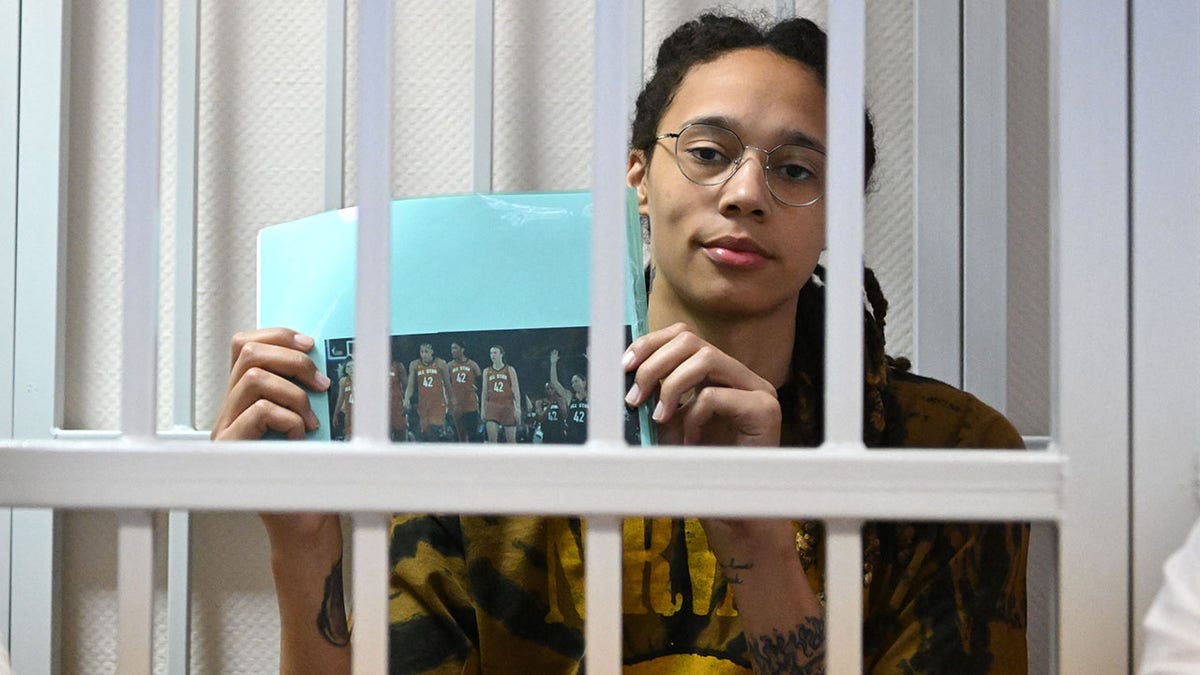WNBA player Brittney Griner faces decade in Russian prison on drug charges
'Clay Travis & Buck Sexton Show' hosts Clay Travis and Buck Sexton sound off on the 'incompetence' of Biden as she and other Americans languish overseas.
Bad behavior by the world’s rogue actors has become so shocking that we can lose track of their full array of dirty tricks. So, it is with the age-old practice of hostage-taking, which is staging a comeback. Even one of the world’s most famous women, basketball star Brittney Griner, couldn’t escape the vicious game of hostage diplomacy.
Caged since February and possibly facing a decade in prison for allegedly possessing cannabis oil, the Olympian is a pawn in Russian President Vladimir Putin’s war on Ukraine as he pushes back at sanctions and his forces battle western weapons. She joins dozens of fellow Americans and many more westerners languishing in captivity.

WNBA star and two-time Olympic gold medalist Brittney Griner is escorted to a courtroom for a hearing, in Khimki outside Moscow, Russia, Thursday, July 7, 2022. (AP Photo/Alexander Zemlianichenko)
It goes far beyond Russia. From Azerbaijan to Cuba, Iran, North Korea, and Venezuela, we see hostages taken again and again as bargaining chips by autocratic regimes. While Article 3 of the Geneva Conventions prohibits this, and democracies have sanctioned Syria’s Assad and Russia’s Putin for their aggression and butchery, hostage diplomacy goes strangely unpunished.
Governments tend to buckle in the face of pressure by paying ransom, caving into prisoner swaps that let criminals go free, and other concessions. Indeed, autocrats know democracies are often willing to violate core values to bring home their citizens.
As citizens of democracies, when our governments allow this – when we project indifference to fellow citizens stripped of the presumption of innocence – we are in effect supporting the hostage-takers. We should make the practice extremely costly for the perpetrators.

US WNBA basketball superstar Brittney Griner sits inside a defendants' cage during a hearing at the Khimki Court in the town of Khimki outside Moscow on July 15, 2022. (Photo by NATALIA KOLESNIKOVA/AFP via Getty Images)
We might start by remembering the lessons of the past. In medieval times, high-level hostages were used as collateral to ensure that each side followed through with commitments; we have found other ways to guarantee contracts.
Ruthless rulers have also used hostage ransom as a primary financial resource. In the early 1800s, the United States and Sweden fought against four North African states to stop pirates from seizing merchant ships and holding the crews for ransom.
BRITTNEY GRINER HAD DOCTOR’S RECOMMENDATION FOR MEDICAL CANNABIS IN US
"To the shores of Tripoli," the line from the Marines’ Hymn, refers to this war, which followed unfruitful diplomatic efforts by Presidents Jefferson and Adams, when the Barbary rulers miscalculated America’s military capabilities and were defeated, finally putting an end to the piracy. Force works with those who understand only force.
As citizens of democracies, when our governments allow this – when we project indifference to fellow citizens stripped of the presumption of innocence – we are in effect supporting the hostage-takers.
In modern times, with international law in place but only haphazardly enforced, the taking of hostages has become a weapon of diplomacy. A cheap asymmetrical weapon, rogue regimes can deploy it effectively against the U.S., Canada, France, the United Kingdom, and other powerful nations.
Autocratic leaders use their state-controlled media to spin a narrative that justifies the seizing of foreigners, while the news media in democratic countries is compelled to cover the event as a public service, in effect publicizing the demands. Thick-skinned dictators and their henchmen weather the external bad press, while striking fear in the rest of the world and celebrating their impunity to the rule of law.
In 1979, militant Iranian students and their newly installed Islamic Republic enablers stormed the U.S. embassy and took 52 Americans hostage, demanding the return of the Shah to stand trial. The terrorists failed to hang the Shah but did manage to throw the mighty United States into disarray.
Emboldened, Iran has played the hostage-taking game ever since.
For five years recently, Iran held Britain’s Nazanin Zahari-Ratcliffe and Anoosheh Ashoori, on false charges of plotting an overthrow of the government and spying for Israel. While both were released after the U.K. reached a financial settlement, Iran still holds dozens of dual citizens and foreigners on various charges without due process.
WNBA ALL-STARS HONOR BRITTNEY GRINER DURING GAME: 'SHE'S OUR SISTER'
Iran may be the most prominent practitioner of hostage-taking statecraft; however, Russia is an active violator well beyond the mighty WNBA player now powerless to the whims of the Kremlin.
Two former U.S. Marines have been imprisoned on trumped-up charges in the country. Trevor Reed was sentenced to nine years for allegedly assaulting an officer in 2019.
To free Reed, the U.S. was forced to "trade" a Russian pilot who was serving a lengthy prison sentence on drug smuggling charges.
CLICK HERE TO GET THE OPINION NEWSLETTER
The other prisoner, Paul Whelan, is serving 16 years on espionage charges. There is a strong suspicion in the intelligence community that Whelan is being held in the hopes of a trade for convicted Russian arms dealer Viktor Bout.
If diplomacy is the only way to win Whelan and Griner’s release, we should hope that any deal that the Biden administration makes would involve painful compromise by the hostage-takers as well.
Russia and Iran have taught other countries that they can behave with impunity too.
Following the 2020 Nagorno-Karabakh War, Azerbaijan chose to violate a cease-fire agreement with Armenia in which POWs and civilians were to be released. Armenia promptly set free all Azeri prisoners of war.
A year and a half later, Azerbaijan still holds some 40 Armenian soldiers and civilians against their will. Video evidence and testimony has shown that they have endured torture.
Human Rights Watch, and the European Parliament has passed a resolution demanding the immediate release of the hostages. So far, Azerbaijan remains committed to the war crime of hostage-taking to exact territorial concessions from Armenia.
The growing trend of hostage diplomacy needs to stop.
CLICK HERE TO GET THE FOX NEWS APP
World and business leaders, and all of us as defenders of the free world, should fight back at criminal autocrats through sanctions, boycotts, and international censure. Failing to do so puts us in even greater peril and robs far too many years of their lives.
Tolerating this vicious practice diminishes us as citizens as well.














































